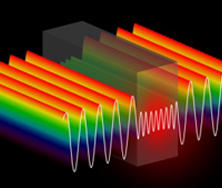Researchers at China's Fudan University have come up with a theory that could very well lead to the advent of a Star Trek-like tractor beam.
Read More »Blog Archives
Bitter Tastes May Lead to Bitter People
Research from the City University of New York shows that there may be a link between what a person tastes and their overall mood.
Read More »Two Planets Discovered Sharing One Orbit
Images from the Kepler Telescope have discovered that in the KOI-730 solar system there are two planets that share a single orbit.
Read More »Land Usage Impacting Climate Near Mount Kilimanjaro
Many advocates for the theory of man-made global warming point to the receding glaciers of Mount Kilimanjaro as clear evidence, but now research claims that it's actually deforestation that is leading to the loss of the mountain's icecap.
Read More »University of Michigan Constructs World’s First Millimeter Computer
Researchers at the University of Michigan have built the world's smallest computer: a one cubic millimeter machine that is designed to monitor the eye pressure of glaucoma patients.
Read More »Study Finds That Cell Phone Use Increases Brain Activity
Dr. Nora Volkow and other researchers from the National Institute of Health have published a report that shows that cell phone use increases certain activity in the brain.
Read More »Professors Warn of Climate Change’s Effects on Food Supply
Professors speaking at the American Association for the Advancement of Science warned against the effects that climate change could have on the world's food supplies.
Read More »NASA Cosmic Census: 50 Billion Planets in Milky Way
NASA scientist working with the Kepler telescope have looked at two years of data and concluded that there is some 50 billion plants in the Milky Way galaxy.
Read More »Hibernating Bears May Hold the Key to Deep Space Travel
Researchers in Alaska believe that unlocking the secrets of hibernation could be the key for humans to travel through deep space.
Read More »Yale Scientists Develop World’s First Anti-Laser
Two scientists at Yale have developed a type of anti-laser that they feel could one day be used to help treat cancer.
Read More » Gearfuse Technology, Science, Culture & More
Gearfuse Technology, Science, Culture & More









